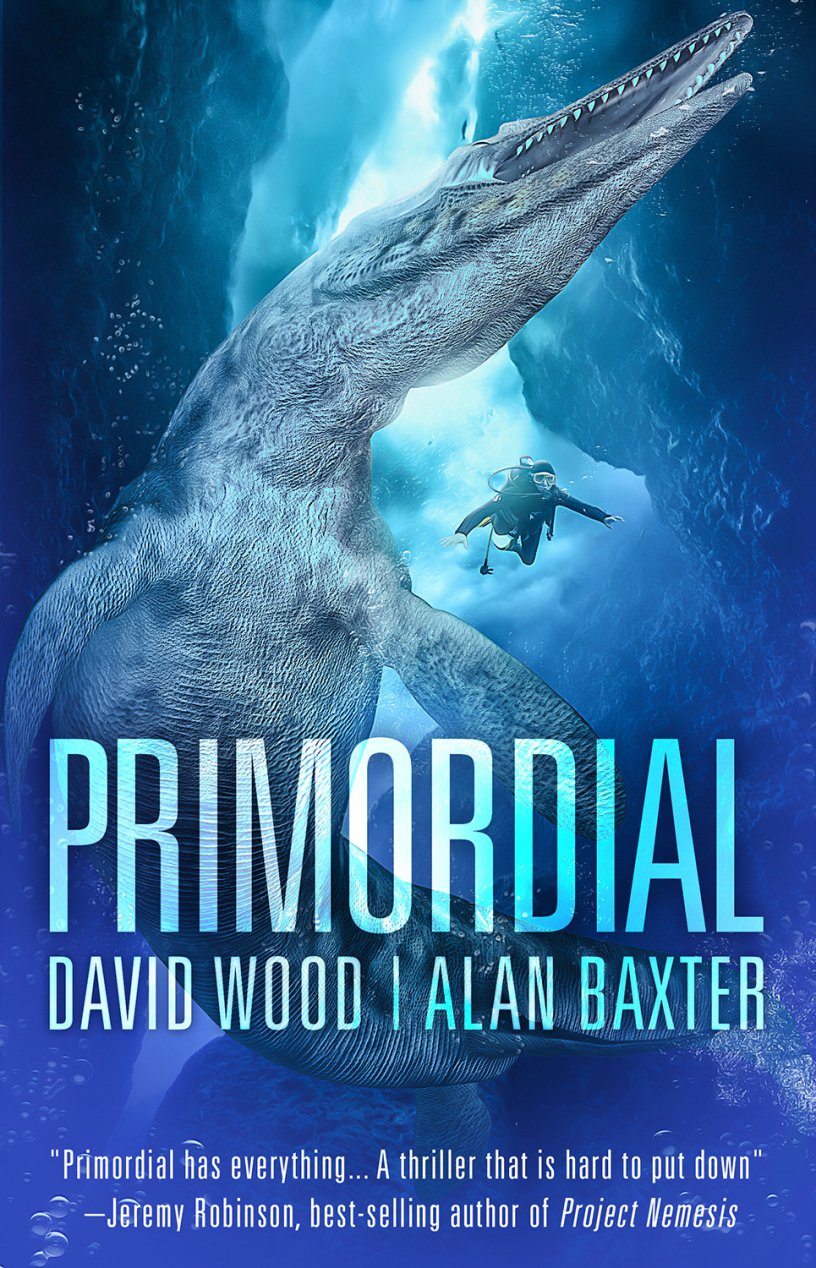Primordial
David Wood and Alan Baxter
2017
Cohesion Press
Reviewed by Michael R. Collings
Primordial, by David Wood and Alan Baxter, is a print version of the classic “Creature Feature,” outlining the search for a purported Nessie-like monster in an out-of-the-way Finnish lake. It establishes its directions early and follows through expertly, even as the narrative takes unanticipated twists and turns.
Marine biologist Sam Aston is on the run from the villainous Chang, a shadowy character who takes it deadly seriously when someone owing him a substantial amount of money seems unwilling or unable to pay up. At the moment when he loses his last best chance to repay, Aston is contacted by an employee of an eccentric billionaire, El-lis Holloway, who offers him more than enough money to settle with Chang in exchange for lending his expertise to a documentary-in-the-making. As wary as he is about the assignment—searching for a prehistoric lake creature in Finland—Aston is forced by his circumstances to take the offer…and becomes one of a dozen or so people whose lives will be altered, and in several cases ended, by Holloway’s obsession.
The choice of a scientist as the primary point-of-view character is important to Primordial. Aston acts as a stop-brake to the precipitate Holloway and as a voice of reason to the more dramatic (and sometimes melodramatic) impulses of Joanne Slater, who is directing the documentary. More than once, he pauses what might otherwise be a typically break-neck foray into monsters by reviewing data, evaluating evidence, and generally allowing the pacing of the narrative to move steadily and inexorably—but logically—to climactic encounters with the creature.
This is important because Wood and Baxter have chosen to integrate a number of disparate elements into the story, yet, through Aston’s presence, manage to keep all un-der control. Over the course of the novel, Aston, Slater, Holloway, and the others confront ancient myths about Lake Kaarme, kept alive by the archetypal Old Mo, native repository of story and legend; tales of people going missing during the full moon at a certain time of the year; an equally hazy but much more recent series of stories about “The Lost Legion,” a missing platoon of Nazi soldiers who disappeared while searching for the entrance to the Hollow Earth; an oddly antagonistic police chief who seems intent on disrupting Holloway’s search; several Finns whose disappearances lend a frisson of terror to the tale; a mysterious hooded figure who appears on the shore and seems to have some mystical connection to the creature; and the monster itself, every bit as powerful and ferocious as an archaic holdover would have to be to survive. And, even more to their credit, Wood and Baxter do it with an occasional spark of dark humor.
The novel acknowledges its roots in film with occasional references to King Kong and Jurassic Park, and with its development through carefully paced scenes. It flirts with the stereotypic—just as Aston and Slater, as expected, flirt with each—but never takes the easy way out of the complications it develops. At times, Holloway suggests Jurassic Park’s John Hammond, but out-Herod’s Herod, as it were, with his increasingly fanatical attitude toward the monster; toward the end, he seems more the obsessed and insane Captain Ahab—especially Gregory Peck’s version thereof—than entrepreneur and businessman.
On the whole, Primordial succeeds well in doing what it set out to do: take a familiar trope in modern horror fiction; transform it through doses of myth and history, story and science; and thereby create an intriguing, engaging, and ultimately entertaining tale.
Recommended.
- Killing Time – Book Review - February 6, 2018
- The Cthulhu Casebooks: Sherlock Holmes and the Miskatonic Monstrosities – Book Review - January 19, 2018
- The Best Horror of the Year, Volume Nine – Book Review - December 19, 2017
- Widow’s Point – Book Review - December 14, 2017
- Sharkantula – Book Review - November 8, 2017
- Cthulhu Deep Down Under – Book Review - October 31, 2017
- When the Night Owl Screams – Book Review - October 30, 2017
- Leviathan: Ghost Rig – Book Review - September 29, 2017
- Cthulhu Blues – Book Review - September 20, 2017
- Snaked: Deep Sea Rising – Book Review - September 4, 2017



